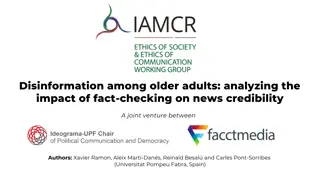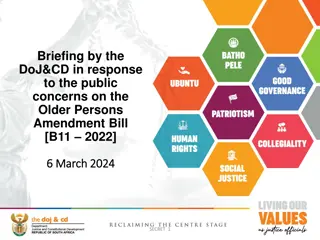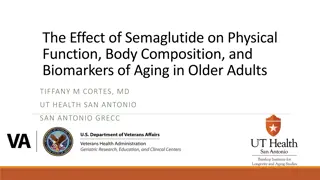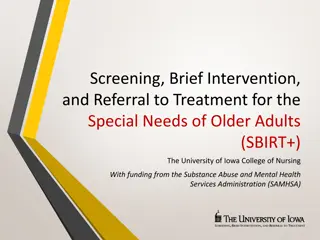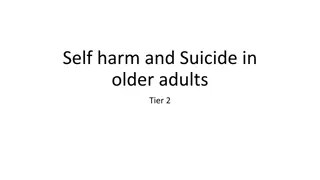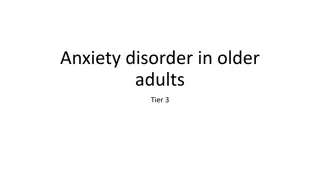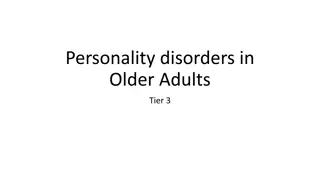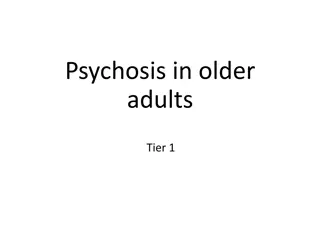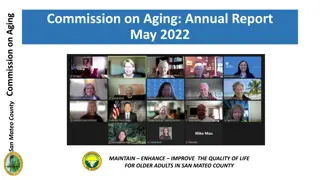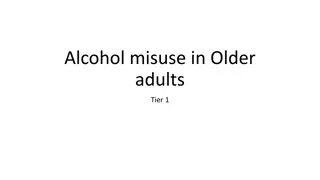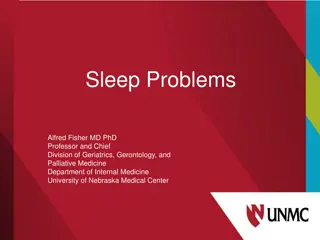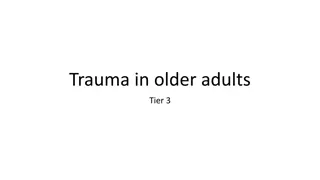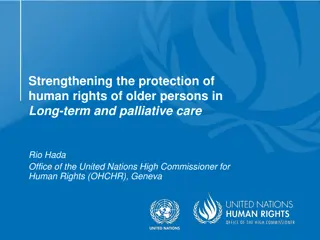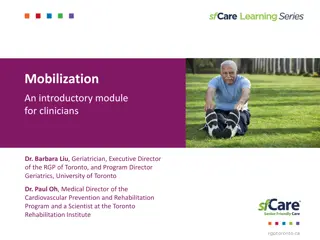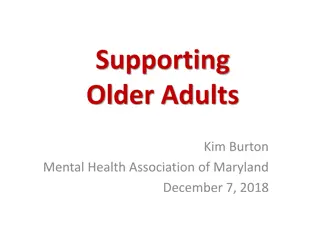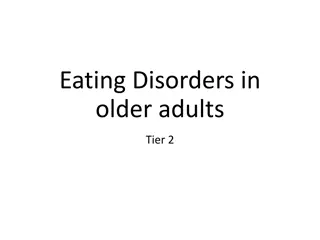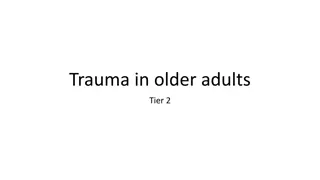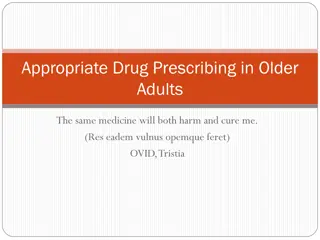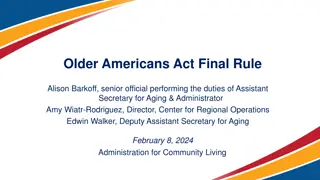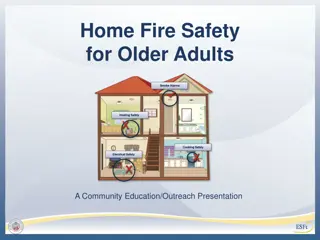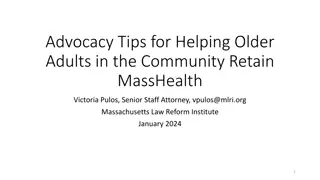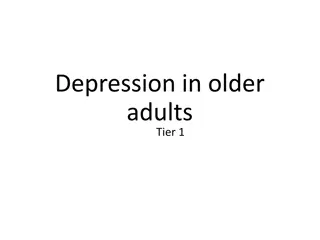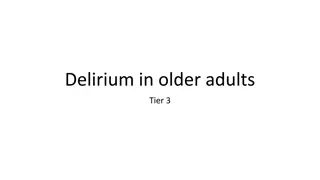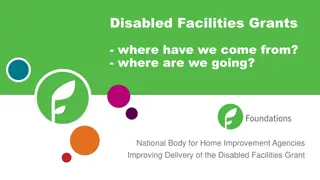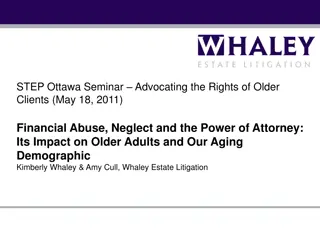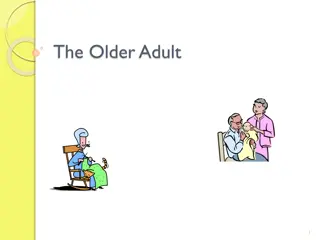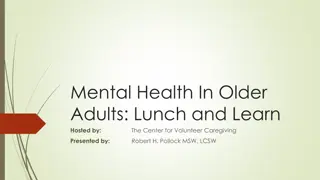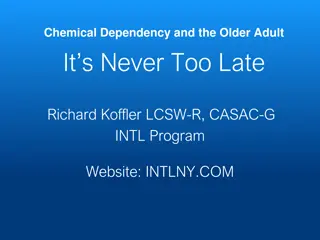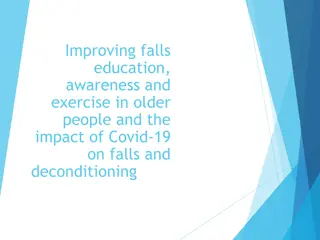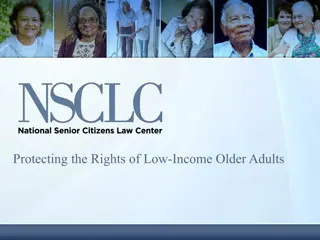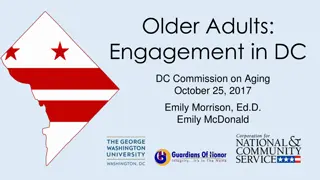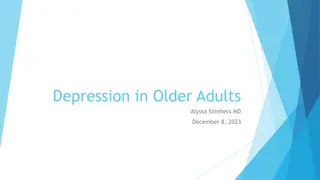Impact of Fact-Checking on Credibility Among Older Adults
Analyzing the impact of fact-checking on news credibility among older adults reveals that age is a key factor in information credibility. Older adults tend to give more credibility to various kinds of information, leading to potential challenges in discerning between true facts and false news. Fact-
5 views • 31 slides
Addressing Concerns on Older Persons Protection: Response to Public Feedback
The Department of Justice and Constitutional Development responds to public concerns on the Older Persons Amendment Bill. The presentation focuses on key issues such as property rights, coercion, legal fees, and accessibility for older persons. Legal frameworks, including clauses in the bill and rel
0 views • 17 slides
Effect of Semaglutide on Aging Biomarkers in Older Adults
Semaglutide, a GLP-1 receptor agonist, shows promising effects on physical function, body composition, and aging biomarkers in older adults with diabetes. Studies suggest potential neuroprotective effects, improvement in skeletal muscle atrophy, and reduction in pro-inflammatory markers. Diabetes pr
0 views • 23 slides
SBIRT+: Tailoring Substance Use Intervention for Older Adults
SBIRT+ is a targeted training approach focusing on Screening, Brief Intervention, and Referral to Treatment to meet the unique needs of older adults, addressing risky substance use in the elderly population. It aims to address the growing concern of alcohol use and medication misuse in Baby Boomers
0 views • 38 slides
Understanding Self-Harm and Suicide in Older Adults
Self-harm and suicide in older adults are serious issues that require attention due to the associated risks. The incidence of self-harm in adults aged 65 years and older is notable, with factors such as physical health conditions, pain, and psychiatric history contributing to the risk. Staff should
0 views • 23 slides
Understanding Anxiety Disorders in Older Adults
Anxiety disorders in older adults are prevalent but often unrecognized. These disorders can manifest alongside depression, impacting daily life. Risk factors include gender, education, health status, traumatic events, and more. Types of anxiety disorders include generalized anxiety, phobias, panic d
0 views • 17 slides
Understanding Personality Disorders in Older Adults
Personality disorders in older adults can present challenges in social functioning and relationships. Diagnosis involves assessing difficulties in maintaining relationships, controlling behavior, and listening to others. Recent personality changes may not always be due to a personality disorder but
0 views • 14 slides
Understanding Personality Disorders in Older Adults
Personality disorders in older adults refer to pervasive disturbances in personality and behavior that impact social functioning. Prevalence is around 10% in older community populations, with three main types of disorders categorized by emotional traits. Recent personality changes may indicate under
0 views • 12 slides
Understanding Psychosis in Older Adults
Psychosis in older adults involves a loss of contact with reality, including hallucinations and delusions. Symptoms vary but can include disordered thoughts, behaviors, and negative symptoms. It is common in older adults and can have various causes, such as delirium, mood disorders, dementia, and su
0 views • 10 slides
Annual Report 2020-2021: Commission on Aging's Impact in San Mateo County
The Annual Report 2020-2021 highlights the Commission on Aging's efforts to improve the quality of life for older adults in San Mateo County. They focused on critical areas such as access to resources, transportation, emergency preparedness, and addressing hunger among the elderly population. The re
1 views • 10 slides
Understanding Alcohol Misuse in Older Adults
Alcohol misuse in older adults can have serious health consequences, with harmful drinking patterns and alcohol dependence on the rise among this demographic. Aging bodies process alcohol differently, making older adults more vulnerable to its effects, including physical and mental health issues. Al
0 views • 11 slides
Understanding Sleep Problems in Older Adults
Sleep problems are common among older adults, especially those with chronic illnesses and mood disturbances. Primary sleep disorders that increase with age include sleep-related breathing disorders and restless legs syndrome. Changes in sleep patterns with aging involve decreases in total sleep time
0 views • 16 slides
Understanding Trauma in Older Adults: Importance and Approaches
Trauma in older adults is often unrecognized and undertreated, leading to significant adverse effects on their well-being. It is crucial to realize that trauma can affect up to 90% of older adults, and recognizing signs, responding appropriately, and preventing re-traumatization are key in supportin
2 views • 17 slides
Understanding Self-Harm and Suicide in Older Adults
Exploring the definition, risk factors, incidence rates, and staff approaches related to self-harm and suicide in older adults. It emphasizes the seriousness of self-harm in this demographic, the associated risk factors, and the importance of responding with compassion and support. The content delve
0 views • 21 slides
Understanding Personality Disorders in Older Adults
Personality disorders in older adults can present challenges in living with themselves and others, affecting social functioning and relationships. Prevalence estimates suggest around 10% in older community populations, with males more commonly affected. Different types of personality disorders exist
1 views • 12 slides
Advancing Human Rights of Older Persons in Long-term Care
Strengthening the protection of human rights and promoting equality for older persons in long-term and palliative care is essential in today's society. The demographic shift towards an aging population underscores the importance of respecting older individuals as rights-holders and active agents in
0 views • 12 slides
Mobilization: Importance, Risks, and Recommendations for Older Adults
Encouraging mobilization in older adults is crucial to counteract muscle loss and avoid negative health consequences associated with immobility. This module highlights the impacts of immobility, provides recommendations for mobilization based on frailty status, and offers ideas for promoting mobilit
0 views • 24 slides
Understanding Polypharmacy in Older Adults
Polypharmacy is a common concern among older adults, with approximately 40% taking 5-9 medications and 18% taking 10 or more. This module discusses the factors contributing to polypharmacy, consequences of problematic polypharmacy, strategies for detection and intervention, and the difference betwee
1 views • 36 slides
Addressing Mental Health Challenges in Older Adults
Understanding the mental health challenges faced by older adults is crucial as they navigate through different stages of aging. Issues, vulnerabilities, and risk factors associated with aging can impact their well-being. From age-related vulnerabilities to under-identified and under-treated conditio
4 views • 36 slides
Understanding Eating Disorders in Older Adults
Eating disorders can affect older adults too, yet they are often overlooked or misdiagnosed. Challenges in diagnosing these disorders arise from various underlying health conditions. Types of eating disorders include anorexia nervosa, bulimia nervosa, binge eating disorder, and others. Recognizing c
0 views • 7 slides
Understanding Trauma in Older Adults: A Comprehensive Overview
Trauma in older adults is often under-recognized and under-treated. It can have lasting adverse effects on their well-being. Recognizing the signs, responding appropriately, and avoiding re-traumatization are crucial steps in supporting older adults who have experienced trauma. Triggers such as anni
4 views • 12 slides
Appropriate Drug Prescribing in Older Adults: Balancing Harm and Cure
Understanding age-related changes in pharmacokinetics and pharmacodynamics is crucial for appropriate drug prescribing in older adults. Recognizing high-risk medications to avoid, understanding common drug interactions, and conducting regular drug list reviews are key components in providing safe an
1 views • 47 slides
Understanding the Older Americans Act and Its Impact on Aging Services
The Older Americans Act (OAA) plays a vital role in providing programs and services to support older adults in aging-in-place. This act authorizes various initiatives such as meal assistance, caregiver support, health services, and more to enhance the well-being and independence of older individuals
1 views • 34 slides
Home Fire Safety for Older Adults - Community Education Presentation
The importance of fire safety for older adults is emphasized in this community education presentation. Statistics reveal the significant risks older adults face from home fires and the leading causes behind such incidents. Strategies to reduce these risks through prevention and preparation are discu
0 views • 13 slides
Enhancing Housing Options for Older People in Manchester
The Housing Options for Older People (HOOP) initiative, in partnership with First Stop, aims to address the housing needs of older individuals in Manchester. By providing dedicated resources, support, and services, the program helps older adults maintain independence, improve health outcomes, and re
0 views • 19 slides
Advocacy Tips for Retaining MassHealth for Older Adults
Learn important advocacy tips for helping older adults in the community retain MassHealth, focusing on eligibility rules, key points to consider during renewal, and managing bank accounts effectively. Discover pathways to eligibility, asset and income counting rules, and considerations for clients a
0 views • 20 slides
Understanding Depression in Older Adults
Depression in older adults is not a normal part of aging and should not be ignored. Recognizing the signs and symptoms, such as disturbed sleep, lack of interest, and thoughts of self-harm, is crucial in detecting and addressing this condition. Presentation of depression may include agitation and pe
1 views • 13 slides
Understanding Delirium in Older Adults: Types, Causes, and Symptoms
Delirium in older adults is a complex syndrome characterized by disturbances in consciousness, attention, perception, thinking, memory, and behavior. It commonly presents as hyperactive, hypoactive, or mixed types and can be caused by various factors such as medication, infections, metabolic imbalan
0 views • 17 slides
Understanding Eating Disorders in Older Adults
Eating disorders in older adults can have serious physical and mental health consequences. Recognizing symptoms such as weight loss, phobia, and vomiting is crucial. Treatment is available, and it's important to differentiate between eating disorders and other causes of weight loss in older adults t
0 views • 10 slides
Understanding Depression in Older Adults
Depression in older adults is a serious condition that often goes undiagnosed and untreated. Recognizing the signs and symptoms, understanding the differences in presentation from younger adults, identifying risk factors, and addressing why depression is often missed are crucial steps in supporting
0 views • 15 slides
Supporting Independent Living for Older Adults Through Disabled Facilities Grants
The National Body for Home Improvement Agencies is focusing on enhancing the delivery of Disabled Facilities Grants to support older individuals like Joyce, who face challenges in maintaining their homes due to age-related issues. With a growing number of households led by individuals aged 85 and ov
0 views • 30 slides
Understanding Depression in Older Adults
Depression in older adults is not a normal part of aging and should not be ignored. It is characterized by a group of signs and symptoms, including depressed mood, disturbed sleep, lack of enjoyment, reduced energy levels, and thoughts of self-harm. Older adults may present with different symptoms s
0 views • 22 slides
Understanding the Impact of Financial Abuse and Neglect in Older Adults
Changing demographics highlight the importance of addressing legal abuses towards older individuals. The Power of Attorney (POA) can serve as a beneficial planning tool but also poses risks if misused, potentially leading to financial exploitation and harm. Awareness of the potential dangers associa
0 views • 27 slides
Understanding and Respecting Older Adults: Challenges and Strategies
Exploring the misconceptions and challenges faced by older adults, this content highlights the importance of combating ageism in healthcare. It emphasizes the need for nurses to overcome stereotypes, involve older adults in decision-making, and address their unique needs with respect and understandi
0 views • 21 slides
Understanding Mental Health in Older Adults: Key Insights and Strategies
Explore the complexities of mental health in older adults, covering topics such as life cycle stages, definitions of mental illness and personality disorders, elder abuse, risk factors, and interventions. Gain an understanding of the unique challenges faced by older adults in seeking help for mental
0 views • 20 slides
Understanding Chemical Dependency in Older Adults
Older adults are increasingly affected by alcohol abuse and addiction. This article emphasizes the prevalence of alcohol use in this demographic, the societal misconceptions, and the medical and psychiatric signs to watch for. It sheds light on the importance of identifying and addressing chemical d
0 views • 35 slides
Enhancing Falls Education and Exercise for Older Adults: Impact of Covid-19
Improving falls education, awareness, and exercise in older individuals, particularly considering the effects of Covid-19 on falls and deconditioning. Initiatives include community rehab and falls teams, city care falls services, and comprehensive assessments for older adults. The program focuses on
0 views • 22 slides
Advocating for the Rights of Low-Income Older Adults and LGBT Long-Term Care Consumers
The National Senior Citizens Law Center works tirelessly to protect the rights of low-income older adults through advocacy, litigation, and education. They advocate for LGBT long-term care consumers to ensure their health, economic security, and access to justice. A survey highlighted concerns faced
0 views • 18 slides
Civic Engagement and Volunteering Among Older Adults in Washington, D.C.
Understanding the impact of civic engagement and volunteering on older adults in Washington, D.C. This study explores how older adults engage in community activities, the benefits they experience, and the reasons for emphasizing their involvement. Research highlights the importance of political part
0 views • 29 slides
Understanding Depression in Older Adults: Symptoms, Risk Factors, and Treatment Options
Depressive symptoms in older adults are common but often go unrecognized. While depression is not a normal part of aging, older adults may exhibit a variety of depressive symptoms. Risk factors include pain, isolation, insomnia, medical comorbidities, and more. Classification includes Major Depressi
0 views • 38 slides
